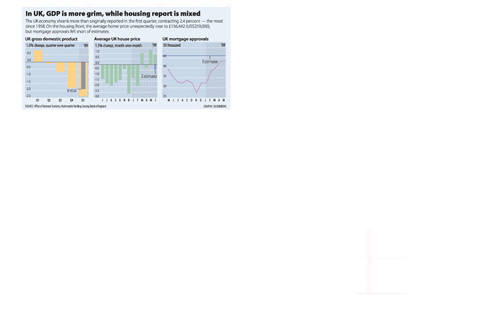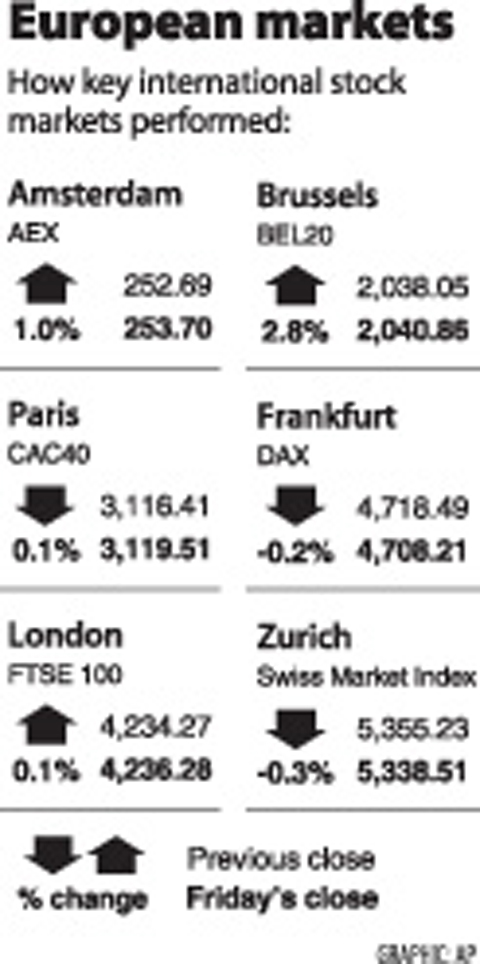European stocks dropped for a third straight week, the longest stretch of losses since March, as concern mounted that the economy won’t recover soon.
Volkswagen AG slumped 6.3 percent, leading declines in automakers, after US car sales fell in June and Credit Suisse Group AG cut its assessment of the industry. ThyssenKrupp AG, Germany’s largest steelmaker, and Finland’s Outokumpu Oyj dropped more than 3 percent as an industry group said European steel consumption will fall this year.
The Dow Jones STOXX 600 Index fell 0.2 percent this week to 204.08 after reports showed unemployment in Europe and the US rose.

The measure has fallen 4.8 percent since June 12 on speculation share prices have outpaced the outlook for economic growth after a three-month rally pushed valuations to 25.4 times earnings, near the highest level since 2004. The benchmark index for European equities still rose 17 percent in the second quarter, the biggest gain since 1999.
“Macroeconomic data are still disappointing and show economic recovery is not yet a reality,” said Emmanuel Soupre, who helps manage about US$18 billion at Neuflize OBC in Paris.
“We are going to keep fluctuating between optimism and pessimism in the months to come,” Soupre said.

Unemployment in the 16-member euro region increased to 9.5 percent in May from a revised 9.3 percent in April, the EU statistics office in Luxembourg said last week. The US unemployment rate rose to 9.5 percent last month, the highest since August 1983.
Bank shares were the best-performing group in the STOXX 600 this week, adding 1.2 percent. Barclays PLC, the UK’s third-biggest bank, rallied 11 percent.
UK consumer confidence increased to the highest level in 14 months last month as shoppers became more optimistic that the worst of the recession is over, GfK NOP said. Debenhams PLC, the UK’s second-largest department-store company, rose 12 percent.
A separate report showed confidence among US consumers slipped unexpectedly last month. The Conference Board’s sentiment index decreased to 49.3 from a revised 54.8 in May.
National benchmark indexes fell in eight of the 18 western European markets. The UK’s FTSE 100 slipped 0.1 percent, while Germany’s DAX dropped 1.4 percent. France’s CAC retreated 0.3 percent as PSA Peugeot Citroen and Renault SA declined.
European Central Bank (ECB) President Jean-Claude Trichet signaled the ECB has no immediate plans to cut interest rates again and said the euro region’s economy will start to recover in the middle of next year. The ECB kept its key lending rate at a record low of 1 percent.
Volkswagen slumped 6.3 percent as Europe’s largest carmaker said US sales last month fell 18 percent. Separately, German car production is expected to drop 17 percent this year, said Matthias Wissmann, the president of the country’s carmakers association, known as VDA.

WAITING GAME: The US has so far only offered a ‘best rate tariff,’ which officials assume is about 15 percent, the same as Japan, a person familiar with the matter said Taiwan and the US have completed “technical consultations” regarding tariffs and a finalized rate is expected to be released soon, Executive Yuan spokeswoman Michelle Lee (李慧芝) told a news conference yesterday, as a 90-day pause on US President Donald Trump’s “reciprocal” tariffs is set to expire today. The two countries have reached a “certain degree of consensus” on issues such as tariffs, nontariff trade barriers, trade facilitation, supply chain resilience and economic security, Lee said. They also discussed opportunities for cooperation, investment and procurement, she said. A joint statement is still being negotiated and would be released once the US government has made

‘CRUDE’: The potential countermeasure is in response to South Africa renaming Taiwan’s representative offices and the insistence that it move out of Pretoria Taiwan is considering banning exports of semiconductors to South Africa after the latter unilaterally downgraded and changed the names of Taiwan’s two representative offices, the Ministry of Foreign Affairs (MOFA) said yesterday. On Monday last week, the South African Department of International Relations and Cooperation unilaterally released a statement saying that, as of April 1, the Taipei Liaison Offices in Pretoria and Cape Town had been renamed the “Taipei Commercial Office in Johannesburg” and the “Taipei Commercial Office in Cape Town.” Citing UN General Assembly Resolution 2758, it said that South Africa “recognizes the People’s Republic of China (PRC) as the sole

NEW GEAR: On top of the new Tien Kung IV air defense missiles, the military is expected to place orders for a new combat vehicle next year for delivery in 2028 Mass production of Tien Kung IV (Sky Bow IV) missiles is expected to start next year, with plans to order 122 pods, the Ministry of National Defense’s (MND) latest list of regulated military material showed. The document said that the armed forces would obtain 46 pods of the air defense missiles next year and 76 pods the year after that. The Tien Kung IV is designed to intercept cruise missiles and ballistic missiles to an altitude of 70km, compared with the 60km maximum altitude achieved by the Missile Segment Enhancement variant of PAC-3 systems. A defense source said yesterday that the number of

Taiwanese exports to the US are to be subject to a 20 percent tariff starting on Thursday next week, according to an executive order signed by US President Donald Trump yesterday. The 20 percent levy was the same as the tariffs imposed on Vietnam, Sri Lanka and Bangladesh by Trump. It was higher than the tariffs imposed on Japan, South Korea and the EU (15 percent), as well as those on the Philippines (19 percent). A Taiwan official with knowledge of the matter said it is a "phased" tariff rate, and negotiations would continue. "Once negotiations conclude, Taiwan will obtain a better